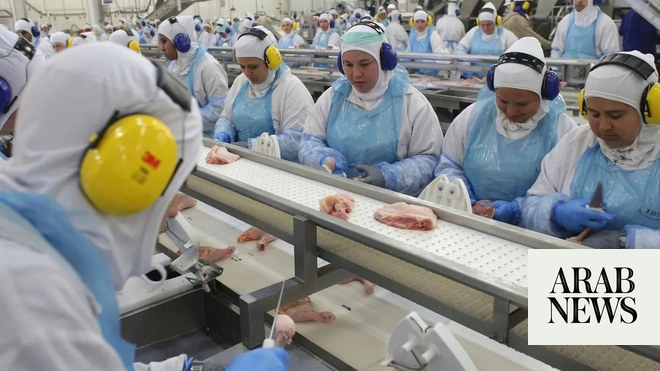
A vegan food company is sparing no blushes with what it calls a “light-hearted” advertising campaign to encourage more Britons to avoid eating meat.
Meatless Farm says it is targeting people who have cut down on bangers and burgers during lockdown with its provocative slogan M*** F***, launched on Monday with a national campaign.
The words will appear on TV and radio adverts, electric cars, social media and supermarket packaging.
The Leeds-based brand, which claims that its meat-free or fake burgers, mince and sausages (made from pea protein) taste and look like the real thing – is seeking to build on huge growth in the UK, and as shoppers’ interest in plant-based alternatives has risen during lockdown.
It says sales have nearly tripled – up by 179% year on year according to the market research company Nielsen – driven by health, environment and welfare reasons, and as more than a third of Britons say they have eaten more plant-based food while confined to their homes. Now it wants to emphasise the versatility of meat alternatives.
According to Nielsen, Meatless Farm is the fastest growing UK brand in a sector that is seeing annual growth of about 10%. Global demand for plant-based protein – dominated by the US giants Impossible Burger and Beyond Meat – is predicted to be £4.1bn this year, from £2.9bn in 2015.
Michael Hunter, Meatless Farm’s chief growth officer, said: “Throughout lockdown we’ve seen a surge in sales, with more and more Brits trying or considering making the swap to plant-based, even if it is just once a week.
“We felt the nation needed a bit of a lift as it’s been a tough time for everyone, so more than ever we wanted to create something light-hearted and fun that consumers would remember when they are looking for alternatives to meat.”
The £1.5m campaign is the biggest advertising yet by the company, which was launched in 2016. Its products are on sale through Tesco, Sainsbury’s, Morrisons and Asda – and online via Ocado – as well as through restaurants and pubs via partnerships with Brakes, Itsu, Woods Foodservice and Wadworth.
The M*** F*** campaign is a step change for the brand, which has built a following on social media and is now aiming to grow its market share by targeting former meat eaters who made the swap during lockdown. It will be supported by print advertising, branded electric cars driving through London, billboards, bus signs and a radio ad. A TV ad will appear on Channel 4 throughout August and September.
As well as provoking with its suggestion of offensive language, the move is bound to ruffle the feathers of livestock farmers, whose businesses have been hard hit by Covid-19. The closure of restaurants and pubs in March disrupted the supply chain, leaving many with surplus cuts of steak and roasting joints that they struggled to sell.
Helen Browning, chief executive of the Soil Association, said: “It’s easy to target all meat with the same brush, but it’s important to recognise that there is a big difference between meat produced to ethical standards and the cheap and nasty stuff that comes from very intensive livestock systems. We urge that people should eat less meat, but eat high-welfare, sustainably produced meat when they do.”
Stuart Roberts, deputy president of the National Farmers’ Union, commented: “In Britain, our farmers are already leading the way in climate-friendly food production and we have the ambition to be even better, working towards net zero agriculture by 2040. We would never dream of telling anyone what they can and cannot eat. But if you want to eat quality, nutritious red meat as part of a healthy, balanced diet and be confident that it’s been sustainably produced, buying British is a great place to start.”
The Advertising Standards Authority (ASA) said it would investigate complaints about “decency” after the campaign’s launch
In August 2004, the clothing chain French Connection dropped the infamous FCUK logo from its advertising after years of complaints and censures from watchdogs.
Last year, millions of pounds were wiped off the value of the exercise bike firm Peloton after a backlash against a Christmas advert derided as “sexist and dystopian”. In March, the ASA banned a series of “scaremongering” ads for face masks that it said played on fears about the coronavirus.












